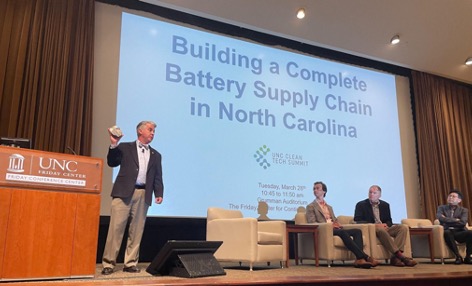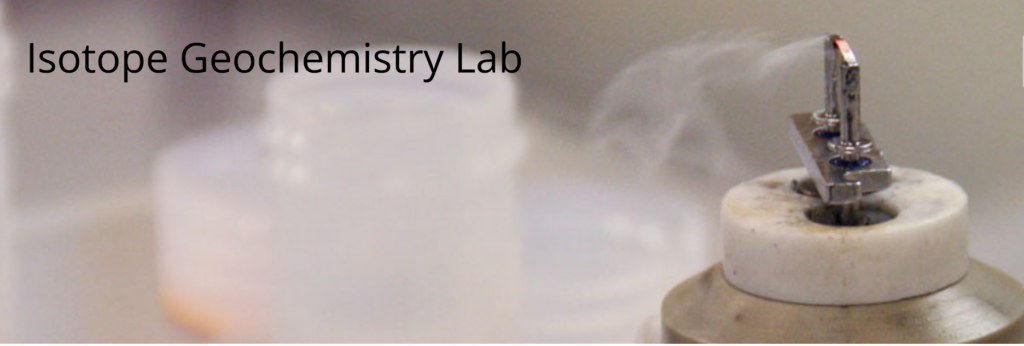By Sarah Masters
Sarah Masters is a junior at UNC studying environmental science with minors in data science and philosophy, politics, and economics (PPE). Sarah has been working with the North Carolina Collaboratory since the spring semester of 2023 as an environmental policy intern focusing on clean energy developments in North Carolina.
When you think of electric vehicles (EVs), I bet North Carolina isn’t the first state that comes to mind. But what if I told you that our state is building a nation-leading EV battery supply chain? I’ve been researching this topic for over a year now and learned that NC has an abundance of essential minerals necessary to build EV batteries and cars. Lithium-ion batteries are a crucial component, making lithium an essential commodity for the industry. It turns out that we have the largest hard-rock deposit of lithium in the nation, held in the 25-mile-long Carolina Tin-Spodumene Belt that stretches from the state’s northern to southern border. Phosphate can build the lithium-phosphate battery, an alternative to lithium-ion batteries. Beaufort County, NC happens to house the largest integrated phosphate mine in the world.
Diving Into EV Supply Chain at the Cleantech Summit

N.C.’s abundance of lucrative minerals has brought many companies focusing on EV production to the state, whether that be in mining, lithium battery technology, or manufacturing. Several of these companies were present at the Institute for the Environment’s annual Cleantech Summit last March. The Summit had two panels focused on batteries, both moderated by Jeff Warren, the executive director of the North Carolina Collaboratory.
The first battery panel is pictured above and was titled, “Building a Complete Battery Supply Chain in North Carolina.” It featured leaders from Ford, Piedmont Lithium, and Soelect (a Greensboro-based provider of a new lithium technology). The second panel, “Battery materials and Supply Chains,” brought together employees from The United States Geological Survey (USGS), Panasonic, The Metals Company (focuses on producing metal that can be reused repeatedly), and Nth Cycle (aims to reuse critical metals from batteries and mining ores).
I had the pleasure of helping create talking points for both of these panels and attending the discussions. Each panelist had their own unique take on the developments in N.C. surrounding lithium mining and battery manufacturing. It was fascinating to hear leaders share successes and challenges with expanding the industry and starting business in N.C. One thing they all agreed upon was that N.C. will be a leader in the EV battery space due to our abundance of raw resources, innovative businesses, and talent coming from the concentration of three accredited universities. Another theme I picked up on was the challenge of navigating the permitting process, as waiting on permit approvals can impede the growth of a new business.
University Research Evaluating Next Generation Energy
In addition to connecting with business leaders at the Cleantech Summit, the university also supports research into clean energy technologies. On October 3rd, 2023, the NC General Assembly passed House Bill 259 which allocated $15 million to the Collaboratory for “Next-Generation Energy and Research Development.” The Collaboratory was tasked with leveraging its academic research partnerships with N.C. businesses to research technologies including lithium batteries, computer chip manufacturing, small modular- or micro-nuclear technologies, hydrogen storage, production, and transportation, and grid modeling for power generation, storage, and distribution. The Collaboratory will report to the N.C. General Assembly on its progress by March 15th, 2024.
As a Collaboratory intern, I have been working on parts of this legislative report, identifying energy research the organization has and will fund. One of the main studies the Collaboratory funded involved Drew Coleman investigating improved methods of lithium exploration. Coleman is chair of UNC’s Environment, Ecology and Energy Program and director of Carolina’s Isotope Geochemistry Lab.

In June of 2023, Coleman and his lab achieved preliminary results that worked at resolving age patterns of lithium rock in the Carolina Tin-Spodumene belt that, once fully determined, will improve extraction methods. His group partnered with Piedmont Lithium to observe their mineral cores and other property. Private-public partnerships have proven highly beneficial to continued research on energy developments in N.C.
Coleman also demonstrated the utility of using a new extraction technology, a hand-held laser analyzer, for predicting where lithium-bearing rocks are below Earth’s surface. This new technology (Laser-Induced Breakdown Spectroscopy or LIBS) is now being used broadly across the industry in part thanks to Coleman’s research. The Collaboratory is actively engaged with researchers across the UNC System on similar studies involving lithium technologies.
Exciting things are coming for N.C. As of August 2022, there were 43 potential automotive sector projects in N.C, with the majority of projects being related to the electric vehicle supply chain. The list has only grown since then. With the state’s raw materials, business centers, and research universities, we are in a position to lead the nation in the EV industry. It’s been a great learning experience to follow these developments and see the various ways UNC is leading the conversation and supporting research on these technologies.
This year’s 10th annual UNC Cleantech Summit will be held on March 21-22, 2024. More information and registration can be found here: https://ie.unc.edu/events/cleantech/

